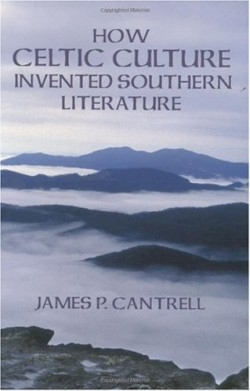How Celtic Culture Invented Southern Literature
The Celtic culture in America has not gotten the credit or attention it deserves, when one considers its great influence on Southern literature. That’s the contention of the author, a scholar of Southern literature. Cantrell asserts that the literary influence of the Scotch-Irish throughout the South, traditionally some of that region’s earliest settlers, has been overshadowed and minimized by the more dominant Anglo-Saxon culture, both stateside and, historically, abroad.
The Celts’ “place” in America, unfortunately, has too often been depicted as the “redneck” or “poor white trash” segment of our society, and these people have been treated as provincial, backward, uneducated castoffs. The author, in this academic treatise, digs deeply into the massive trove of Southern literature, postulating that Celtic Americans in the South have had a bigger impact on the printed page and American history than most readers—and other academicians—acknowledge. And, to the author, that message cannot come soon enough.
Cantrell warns: “Also important is that scholars in their efforts to promote multiculturism not ignore Celtic peoples and their cultural contributions to the United States because of the headlong trend to emphasize non-European peoples.” He traces, chapter by chapter, the history of Southern literature and the influence of the Celtic culture on the writings and their authors. Notable is William Gilmore Simms, whom the author taps as “the father of Southern literature.” Simms, the son of an Irish immigrant, was born in South Carolina in 1806. His novels contained the distinctive elements needed to be considered “Southern literature”: an awareness of the past, a firm identification with the past, community involvement, a storytelling bent, a strong sense of family and an unusually vivid consciousness of caste and class, especially race.
Margaret Mitchell, author of the Southern opus, “Gone with the Wind,” was a descendant of Celtic immigrants. Her most memorable character, Scarlett O’Hara, is an Irish descendant whose family must contend with condescending, highbrow English neighbors. Scarlett’s father instills in her a love of the land.
The author holds a PhD in American literature with an emphasis on Southern literature from the University of Arkansas, and has published essays and book reviews in several magazines and scholarly journals, including Eire-Ireland, The Irish Worldwide. His audience for this book is the academic community, and the work reflects that focus, with its multi-page bibliography and copious footnotes. But this heavily researched book does remind readers that Celtic culture has played a solid role in Southern literature’s development.
Reviewed by
Karl Kunkel
Disclosure: This article is not an endorsement, but a review. The publisher of this book provided free copies of the book to have their book reviewed by a professional reviewer. No fee was paid by the publisher for this review. Foreword Reviews only recommends books that we love. Foreword Magazine, Inc. is disclosing this in accordance with the Federal Trade Commission’s 16 CFR, Part 255.

